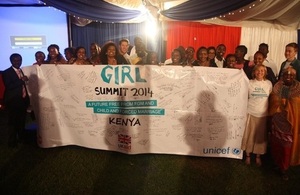DFID and UNICEF host Nairobi Girl Summit
DFID and UNICEF hosted the Nairobi Girl Summit on 21st July to galvanize support for an end to FGM and Child, Early Forced Marriage (CEFM)

Dr. Christian Turner and Lisa Phillips and other participants at the Nairobi Girl Summit hold up a banner with signed pledges
The British High Commission through DFID-Kenya and UNICEF hosted the Nairobi chapter of the Girl Summit on 21st July. The event brought together over 100 guests from across government, civil society and the international community to galvanize support for an end to Female Genital Mutilation/Cutting and Child, Early Forced Marriage (CEFM).
Hosted a day before the London Girl Summit, the event was held to debate and discuss the challenges around FGM and CEFM and generate ideas on interventions that will help eradicate the practices in Kenya.
Speaking at the event, British High Commissioner to Kenya, Dr. Christian Turner said: “The UK Government is committed to a world where all girls and women can fulfil their potential free from discrimination and violence. Their potential: this is what it’s all about. Female genital mutilation (FGM) and child, early and forced marriage (CEFM) are two harmful practices which stand in the way of this vision”.
Also speaking at the event, Head of DFID-Kenya, Lisa Phillips said: “In Kenya we are taking action against Child and early forced marriage and FGM, but there is much more to do. By bringing all these issues together we believe that in time we can give girls and women around the world the chance to write their own future. Building on mobilising young people, government, political leaders, civil society, development partners and the private sector, local communities to standing up against these practices”.
The event’s keynote speaker was Hon. Lady Justice Njoki Ndung’u, who during her term as a Member of Parliament was credited for putting together the Sexual Offences Act in 2006 and sponsoring the Anti-FGM Act in 2011. She expressed concern that, despite the required policies and legislation being in place, FGM remained prevalent in Kenya. She urged the government to allocate resources to address FGM and CEFM and called for an increase in political will to investigate and prosecute offenders. She undertook to be a champion for an end to the practice and to use the courts to dispense justice.
Several victims of FGM shared their experiences of how the practice is secretly performed on girls during child birth or puberty. A Member of Parliament gave an account of how she narrowly survived, and how her exposure to education and other cultures had helped her to develop a curriculum for her community which is now a model for alternative rites of passage.
The key outcomes of the event included a shared understanding and commitments to tackle FGM and CEFM, renewed energy to work together and the commitment by political leaders and government to work with local elders and the gate-keepers of culture to end the practice.
In March 2013, DFID announced a new programme of up to £35 million over 5 years, toward ending FGM in Africa and beyond. In Kenya, the programme supports the UNICEF/UNFPA joint programme on ending FGM/C. The programme aims to reduce FGM/C by 30% in at least 10 countries in Africa (including Kenya) and has a vision to see an end to the practice in a generation. The UK is leading the way by investing the largest single donor commitment ever into the issue.
At the end of the event, guests were called upon to sign a pledge committing to end FGM and CEFM within the generation. Photos of the event here